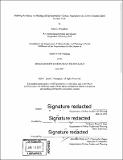Building resiliency or holding off the inevitable? climate adaptation on a dense barrier island in New York
Author(s)
Heneghan, Jessie L. (Jessie Lee)
DownloadFull printable version (17.24Mb)
Other Contributors
Massachusetts Institute of Technology. Department of Urban Studies and Planning.
Advisor
Brent D. Ryan.
Terms of use
Metadata
Show full item recordAbstract
Finishing the hottest year on record, which happens to be the third hottest year in a row, climate change at this point is indisputable. The need to adapt to a changing climate has become increasingly apparent in low-lying coastal towns and cities as the impacts from climate change including more frequent and powerful storms and rising sea levels intensify. The question of how small, dense, and highly vulnerable coastal communities stay in place, adapt, and build resiliency remains for the most part unanswered. This paper aims to shed light on this topic by employing a mixed method research design incorporating qualitative and observational methods in the analysis of climate adaptation planning on the barrier island of Long Beach, NY five years after Hurricane Sandy left the island devastated. Relying on theories of ecological resiliency that call to mind a 'safe-to-fail' approach rather than engineering resiliency's 'fail-safe' mentality, I look at climate adaptation plans and projects on the barrier island through the conceptual framework of creating systems that anticipate and strategically design for failure through redundancy of functions, connectivity, multifunctionality, adaptive planning, and bio and social diversity. I found that several challenges and obstacles stand in the way of achieving resiliency for the barrier island, including funding gaps, strict permitting processes, entrenched 'home rule', lack of coordination regionally, environmental justice and equity concerns, and the design of resource allocation, among others. Resiliency planning in this context of separate, 'one-off' small adaptation projects within strict municipality boundaries, delayed by permitting and funding issues, can be seen as 'too little, too late'. However, based on my analysis, I make recommendations for a regional approach to resiliency, whereby the various governing bodies of the island together devise a plan for the entire island as one landmass and natural ecology. This new regional entity would be in a position to consider a plan for strategic retreat of those most vulnerable socioeconomically from the places most susceptible to storm surge and sea level rise to safer ground within the same island, as well as to pursue other feasible approaches to creating resiliency for the barrier island of Long Beach.
Description
Thesis: M.C.P., Massachusetts Institute of Technology, Department of Urban Studies and Planning, 2017. Cataloged from PDF version of thesis. Includes bibliographical references (pages 68-70).
Date issued
2017Department
Massachusetts Institute of Technology. Department of Urban Studies and PlanningPublisher
Massachusetts Institute of Technology
Keywords
Urban Studies and Planning.